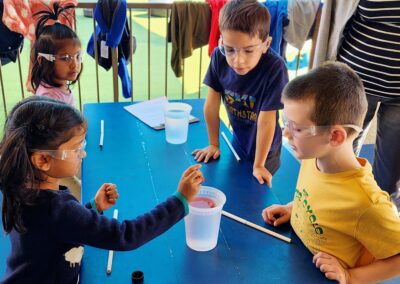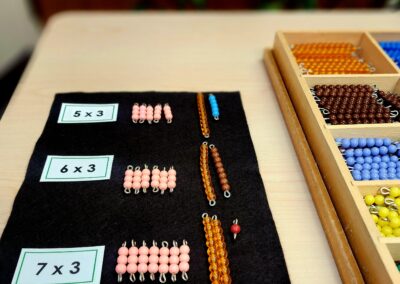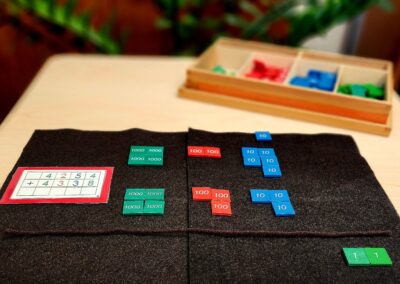KINDERGARTEN AT AFM
Where Strong Foundations Become Lifelong SkillsACADEMICS, CONFIDENCE, LEADERSHIP
An Individualized Education
Who wouldn’t want their child to learn in an environment where they are treated as an individual with a lesson plan tailored specifically for them? At Ahwatukee Foothills Montessori, our 1:7 teacher-to-student ratio extends to our kindergarten program, enabling our educators to provide one-on-one instructional time with your child every day. In contrast, the AZ teacher-to-student ratio is 1:20.
At AFM, there are no limits to learning, allowing your child to advance at their individual level and pace for as long as they attend our program. In contrast, traditional public and charter schools do not have the resources necessary for children to learn at their own rate, which can leave some students struggling to keep up while others feel disengaged as they wait for their peers. Even charter schools typically only accommodate learning that is one or two grade levels above the enrolled curriculum. To support personalized education, we utilize a Montessori-oriented database system, allowing us to record daily progress for each child and generate tailored reports. Our meticulous record-keeping and observation methods ensure that we can follow each child’s unique pace, enabling us to accelerate their learning or revisit concepts as needed.
Math
The math curriculum in kindergarten moves well beyond counting and cardinality, though those skill sets certainly come into play as students begin to explore more complicated concepts. AFM kindergarten students use their algebraic thinking skills when they engage with Montessori materials to explore the four major operations of addition, subtraction, multiplication, and division. These operations are expanded to include multi-digit numbers in both static and dynamic forms, allowing students to write and record questions while fluently reading mathematical sentences.
Concepts such as time, measurement, fractions, and graphing are explored through both the experinces with the classroom materials and hands-on experimenting. Unlike traditional methods that emphasize memorization, AFM’s math curriculum is designed to cultivate a deep and concrete understanding of math concepts, ensuring that knowledge is retained throughout their academic journey.
Science, Geography and Engineering
In geography, AFM students study both cultural and structural aspects, learning the names and definitions of countries, states, capitals, and various geological formations like archipelagos and isthmuses. Kindergarten students can take a closer look at a specific continent or country, learning details about the customs, dress, and food preferences of the people who live there.
Students learn about Earth and Space Science, studying weather and the various patterns and motion of the sun, moon, and planets. They learn about how weather patterns and techtonic shift within the Earth can change the geography of the landscape. In Life Sciences, kindergarten students learn the differences and similarieties between organisms in the phylum Chordata. They learn to identify the bones, organs and systems of the human body.
Kindergarten students engage in hands-on Engineering experiences and experiments that foster independent research and investigation. They learn how to define simple problems or questions, collect and interpret data, and analyze the results.
Language and Literacy
The AFM language and literacy curriculum focuses on decoding, fluency, vocabulary, and comprehension. Students at the kindergarten level delve into parts of speech such as nouns, adjectives, articles, verbs, and prepositions, while gaining a thorough understanding of sentence structure and advanced language concepts, including contractions, verb tenses, punctuation, and grammar. They participate in regular creative writing activities that foster a vital connection between their expressive thoughts and the effective communication of ideas.
A more finely honed focus on spelling skills and following written directions is implemented across the AFM kindergarten curriculum in all subject areas. Curriculum based, daily individualized reading instruction leads kindergarten students to graduate as competent and confident readers.
For a comparison, review Arizona kindergarten standards here: azed.gov/standards-practices
Testing and Preparation for First Grade
In the second semester, students begin weekly spelling tests, learning effective study techniques and test-taking procedures, discovering that assessments are an exciting opportunity to showcase what they know. As the school year progresses, teachers review all previously taught concepts to solidify skills, and through their kindergarten experience, students internalize and master concrete concepts in preparation for abstract thinking. By the end of their time at AFM, students are introduced to more traditional learning styles to ensure a smooth transition to their next educational setting, learning to follow detailed instructions and work independently. Additionally, all kindergarten students practice public speaking by participating in our holiday programs, gaining confidence in front of an audience and overcoming any fears associated with public speaking. Each student concludes their kindergarten year by delivering their own written speech during our graduation ceremony.
AFM Kindergarten vs. Local Public or Charter School Kindergarten
Helping you make the best decision for your child’s next step.
| Area | AFM Kindergarten | Typical Public/Charter Kindergarten |
|---|---|---|
| Class Size & Individual Attention | Small class sizes with daily one-on-one instruction | Larger class sizes with limited individualized instruction |
| Reading Instruction | Daily one-on-one and small group reading support | Group instruction; limited time for one-on-one |
| STEAM Education | Regularly integrated, hands-on STEAM lessons | May have limited or separate exposure depending on school |
| Curriculum Level | Exceeds AZ 2nd grade benchmarks; deeply enriched | Aligned with state standards for Kindergarten |
| Montessori Approach | Continued use of concrete Montessori materials to support abstract thinking | Traditional curriculum; less tactile or hands-on learning |
| Leadership & Confidence Building | Daily opportunities for leadership and regular public speaking opportunities | Varies by school; often less emphasis in early grades |
| Character Education | Intentional, ongoing curriculum focused on respect, responsibility, accountability, and empathy | May include character lessons, but not always consistent or integrated |
| Assessment & Testing Prep | Age-appropriate exposure to testing formats in a low-pressure environment | Typically introduce formal assessments earlier and more frequently |
| Teacher Relationships | Deep understanding of each child’s learning style, progress, and needs | Relationships can vary based on class size and school resources |
| School Environment | Familiar, nurturing, and consistent—your child is known and valued | New school may mean a bigger, more transitional setting |
Why It Matters:
Kindergarten at AFM isn’t just another year—it’s a continuation of everything your child has already begun: confidence, curiosity, academic strength, and personal growth.
By staying, your child benefits from consistency, challenge, and care—all in an environment designed for them to thrive.







